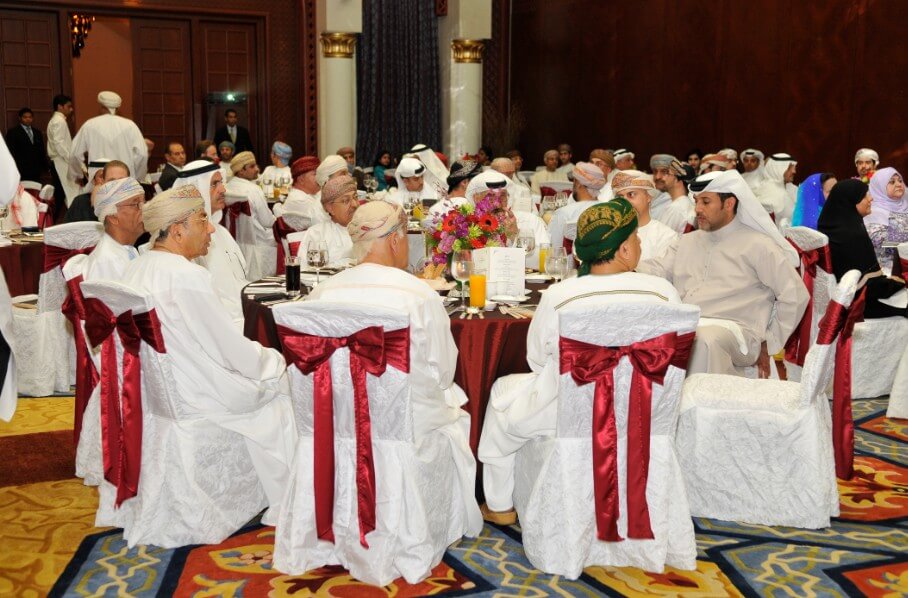Image Source: Walid Ahmad via Pexels
His Excellency Maqbool Ali Sultan, Minister of Commerce and Industry, Sultanate of Oman, honored the Tharawat Family Business Forum by attending its gala dinner entitled ‘Tharawat meets Omani Family Businesses’ at the Shangri-la’s Barr al Jissah Resort. HE Maqbool Ali Sultan addressed the invitees with a speech on the significance of social responsibility in Arab family businesses.
Your Excellencies, Honored Guests,
On this occasion, I am very pleased to welcome the owners of family companies from Arab countries, and the participants of this event. I wish a happy stay for all in Oman.
It also gives me pleasure to address you at the closing of the organized roundtable within the context of the forum, (Tharawat for Family Businesses). This meeting has dealt with the issue of social accountability of the family companies, which is very vital and important to the Arab economy.
It is significant that organizing this event is upon an initiative by the private sector, which predicts the strategic influence of the challenges facing the Arab family companies under the current global financial crisis. The global economy is suffering from real problems and challenges requiring a review of the social and environmental rules and principles of the companies. Arab governments have worked in coordination and combined efforts with the private sector to confront the challenges and minimize the crisis impact. Such efforts have resulted in some success.
Referring to the Economist Intelligence Unit’s report of the last week regarding the extent by which each country of the world has been affected by the financial crisis, we see that the Gulf Cooperation Council countries are classified among the countries that have the ability to face the crisis. We are very proud that the Sultanate of Oman comes sixteenth among 165 countries of the world, and first among Arab countries.
As governments have relinquished many economy-related duties and services, there appears an increasing need to emphasize the social responsibility of companies and the private sector. Most of the Arab countries have adopted open economy policies, exempting them from being the sole responsible for the problems and challenges of social development.
Arab family businesses play a leading role in supporting socio-economic development; especially as they also reap the benefits of it. These companies enjoy good ties with the community, guided by long-term visions, and have flexibility in taking decisions. Their contribution to the development and growth of Arab economies is remarkable. Their entrepreneurs have established commercial and industrial entities that are supportive to the Arab economy. These companies have a great balance of experience that can be useful in finding solutions under the current circumstances of an unprecedented crisis.
However, Arab family companies are facing several challenges that may cause a threat to their achievements realized through the efforts of the founder generation. The most prominent challenges are the problems of succession, governance, the threat of disunity resulting from the disputes among heirs.
Other challenges include the fierce competition among companies locally and internationally because of economic liberation and globalization, and the increasing dominance of multinational companies. Consequently, family businesses have no other choice than to respond to the new circumstances and their requirements. They have to review their organizational structures. Although several family companies have responded to the new circumstances, many others still lack in reaction.
Yet, while opening to change, family companies should be aware of not sacrificing the established values upon which their success has been based. Accordingly, there is an urgent need to prepare qualified leaders within the families. The potential leaders should be able to evolve with the changing social values and the new competitive and innovative technologies.
I believe that family companies are capable of making tangible contribution to human resources development. They can play an effective role in the implementation of relevant development plans through supporting the efforts aimed at promoting professional education and training. They can also increase productive labor through expanding job and training opportunities throughout their different branches.
Family companies can also take part in finding solutions to a major challenge facing our communities; they can provide job opportunities to the annually increasing numbers of the young job seekers. If we look at the demography of the Gulf Cooperation Council countries, we see that the number of young people predominates. About 50% of our people are below 20 years of age; more and more young people will be entering the job market in the coming years.
As there is little possibility of increasing government job vacancies, and government positions are almost saturated, providing job opportunities becomes mainly the responsibility of the private sector. Since this sector is highly interested in profitability and focuses on recruiting qualified people who have skills and are able to contribute to increasing productivity and reducing costs, the solution of this problem is related to education and training.
The labor force in the GCC countries is estimated at 14 million posts; locals represent only 18 percent. There are real opportunities open to a great number of jobs, many of which do not require high or professional qualifications, which may be taken by GCC locals. Furthermore, with the expansion of Information Technology, there are new opportunities for self-employment. Gulf governments have taken steps and carried out many programs encouraging the young people to make use of such opportunities and establish their own start-ups providing opportunities for others.
We hope that big family businesses align their efforts with those of the governments and support small companies and help the self-employed young people. In many ways, small companies established by the young people are the nucleus of future family businesses. These young people need guidance, encouragement and examples from big family companies in order for their newly established companies to become successful. Big family companies may also involve entrepreneurs of start-ups in some business and allocate some activities, supplies, distribution and services to them.
Assuming their social responsibility and as part of their voluntary and charitable activities, big family companies may set up enterprises that serve villages and small towns and enhance the social services there. Under the current market conditions and possible sudden cases of inflation, family businesses exert efforts for the stability of prices, especially the prices of basic consumer items such as food.
On this occasion, I hope that family businesses are aware of the necessity to maintain their existence through developing their organizational structures, updating their managerial methods, improving their response to global economy developments, and expanding their community service activities in addition to their essential economic activities.
Tharawat Magazine, Issue 3, 2009


















